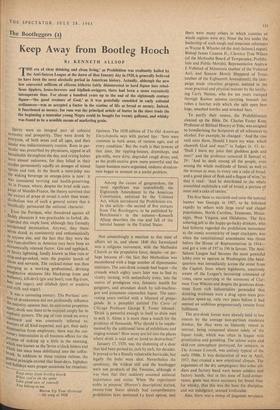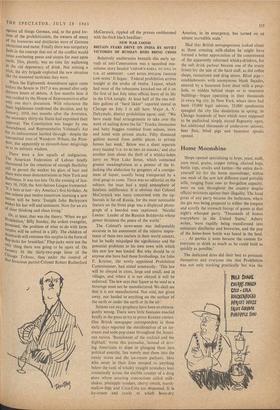The Bootleggers (2)
Keep Away from Bootleg Hooch
By KENNETH ALLSOP `,THE era of clear thinking and clean living,' as Prohibition was exultantly hailed by ji the Anti-Saloon League at the dawn of that January day in 1920, is generally believed to have been the most alcoholic period in American history. Actually, although the new law converted millions of citizens hitherto fairly disinterested in hard liquor into rebel- lious tipplers, home-brewers and hipflask-swiggers, there had been a more excessively intemperate time. For about a hundred years up to the end of the eighteenth century liquor—`the good creature of God,' as it was gratefully ennobled in early colonial ordinances—was as accepted a factor in the routine of life as bread or money. Indeed, it functioned as money, for rum was the principal article of barter in the slave trade (in the beginning a muscular young Negro could be bought for twenty gallons), and whisky was found to be a sensible means of marketing grain.
Spirits were an integral part of colonial economy and prosperity. They were drunk by everyone, of both sexes and all ages, and their intake was indiscriminately routine. Rum in par- , ticular was prescribed by physicians, sipped in all households throughout the day, and crying babies were almost unknown, for they lolled in their cradles permanently squiffy on dosages of mixed opium and rum. In the South a mint-julep was the w#king beverage as orange-juice is now : it was considered reviving and health-preserving. As in France, where, despite the brief milk cam- paign of Mendes-France, the theory survived that the extract of grape or cereal is safer than water, alcoholism was of such a general nature that it beatifically permeated the national character.
Even the Puritans, who thundered against all fleshly pleasures it was practicable to forbid, dis- regarded this staple food, although they formally condemned intoxication. Anyway, they them- selves drank as consistently and enthusiastically as anyone else, and the fact that they were the first rum-distillers in America may have been an economically relevant factor. Gin and applejack, or Jersey lightning, fondly known as blue ruin or strip-and-go-naked, were, the popular hooch of slaves and servants. The cocktail-mixer was then emerging as a working professional, devising imaginative mixtures like blackstrap (rum and Molasses), kill-devil (gin and beer), rum flip (rum, beer and sugar), and sillabub (port or madeira and milk and sugar).
It was a carousing century. The Puritans' cen- sure of drunkenness did not profoundly influence the majority opinion that, its anti-toxin properties apart, drink was there to be enjoyed simply for its , enPhoric powers. The jug of rum stood on every sideboard and was constantly referred to; ‘‘ workers of all kind expected, and got, their daily dispensation from employers; there was the cus- tomary intermission in all business offices for the _PurPose of stoking up a little in the morning, blob was known as the 'leven o'clock bitters and which has since been debilitated into the coffee- break. In addition to those routine rations, the 8_ eneral principle existed that feast-days, highdays and holidays were proper occasions for ritualistic Keep away from bootleg hooch ,When you're on the spree
Take good care of yourself You belong to me.
'Button Up Your Overcoat' —hit song of 1928 tipsiness. The 1830 edition of The Old American Encyclopedia says with pursed lips: 'Sots were common in both sexes, of various ages, and of every condition.' But the truth is that taverns of that time, 'the tippling-houses, dramshops, and gin-mills, were dirty, degraded rough dives; and, as the profit-motive grew more powerful and the liquor business more organised, endemic drunken- ness began to amount to a social problem.
Among the- causes of gangsterdom, the most significant was undoubtedly the Eighteenth Amendment to the American Constitution, enforced by the Volstead Act, which introduced the Prohibition era. In this article--the second of five extracts from The Bootleggers, to be published by Hutchinson's in the autumn—Kenneth Allsop describes the rise and fall of the teetotal banner in the United States.
Not astonishingly a reaction to this state of affairs set in, and about 1840 this formulated into a religious movement, with the Methodist Church as the propulsive force, despite—or per- haps because of—the fact that Methodism was encumbered with a huge number of dipsomaniac ministers. The anti-drink crusade had begun—the crusade which eighty years later was to find its victory turning, with melancholy irony, into the source of prodigious vice, fantastic wealth for .gangsters, and abundant death by sub-machine- gun and poisonous counterfeit liquor. The inter- vening years swirled with a blizzard of propa- ganda. In a pamphlet entitled The Curse of Chicago Professor George E. Foster intoned : `Drink is powerful enough in itself to draw men to seek it. Alone it is more than a match for the prudence of thousands. Why should it be supple- mented by the additional lures of exhibitions and singing women? How many are led into the places where drink is sold and so lured to destruction'?'
January 17, 1920, was the slamming of a door that had been pushed to, inch by inch, for decades. It proved to be a flimsily vulnerable barricade, but legally the bolts were shot. Nevertheless the speakeasy, the wildcat still and the bootlegger were not products of the Twenties, although it was then that they suddenly assumed national importance and status. When 'the experiment noble in purpose' (Hoover's description) started, twenty-four States already had comprehensive prohibition laws instituted t y local option, and there were many others in which counties or whole regions were dry. None the less under the leadership of such tough and tenacious reformers as Wayne B. Wheeler (of the Anti-Saloon League). Bishop James Cannon Jr., Clarence True Wilson (of the Methodist Board of Temperance, Prohibi- tion and Public Morals), Representative Andrew J. Volstead of Minnesota (author of the Volstead Act), and Senator Morris Sheppard of Texas (author of the Eighteenth Amendment), the cam- paign made relentless progress, assisted in the most practical and physical manner by the terrify- ing Carry Nation, who for ten years tramped through Kansas saloons carrying beneath her robes a hatchet with which she split open beer kegs, smashed bottles and wrecked bars.
To purify their source, the Prohibitionists cleaned up the Bible. Dr. Charles Foster Kent, Professor of Biblical History at Yale, was assigned to bowdlerising the Scriptures of all references to alcohol. For example, he changed : 'And the vine said unto them, Should I leave my wine, which cheereth God and man?' in Judges ix. 13, to: `Shall I leave my juice that gladdens gods and men'?' and the professor censored II Samuel vi, 19: 'And he dealt among all the people, even among the whole multitude of Israel, as well to the woman as men, to every one a cake of bread, and a good piece of flesh and a flagon of wine,' so that it read : 'And he distributed to the whole assembled multitude a roll of bread, a portion of meat and a cake of raisins.'
The first State to succumb and raise the teetotal banner was Georgia in 1907, to be followed rapidly by others with large rural and chapel populations, North Carolina, Tennessee, Missis- sippi, West Virginia and Oklahoma. The first sobering jolt to the happy-go-lucky drinkers, who had hitherto regarded the prohibition movement as the comic eccentricity of inept crackpots, was when the constitutional amendment was thrust before the House of Representatives in 1914— and got a vote of 197 to 190 in favour. The Anti- Saloon League had become the most powerful lobby ever to operate in Washington (the head- quarters was immediately across the street from the Capitol, from where legislators, sensitively aware of the League's increasing command of votes, came scurrying at the summons of Clar- ence True Wilson) and despite the generous dona- tions from rich industrialists persuaded that drinking workmen were a drag upon mass pro- duction speed-up, only two years before it had seemed an ambition preposterously remote from fulfilment.
The pro-drink forces were already held in low esteem by the average non-partisan moderate drinker, for they were so blatantly vested in interest, being composed almost solely of the liquor trade, which was often in league with prostitution and gambling. The saloon sccne and skid-row atmosphere portrayed, for instance, in The Iceman Cometh, was entirely typical of the early 1900s. It was declaration of war in April, 1917, that created a new emotional climate. The arguments of the dry campaigners that sober sol- diers and factory hand were better soldiers and factory hands, that in this time of food-conser- vance, grain was more necessary for bread than for whisky, that this was the hour for discipline and not indulgence, seemed irrefutable.
Also, there was a sweep of jingoistic revulsion \ 1 k
,\ N i • : , :.
k . \ , •' ' -
S
• 1/4N 4.\* ■ NL, •.`k\
• RI73S
.Flemish as spoken in Wolverhampton
„„,,,...... , .„,: \ ,_ N V., V .1, .,..,.... \\,..''''‘‘..... V. :::.■ \ \ 0 ‘ VI\ \\\ • ■ ' ,s \ •
The inflaaence of research and production is felt today in every corner of the globe
Imperial Chemical Industries Ltd., London, S.W.x
\ •.'



































 Previous page
Previous page